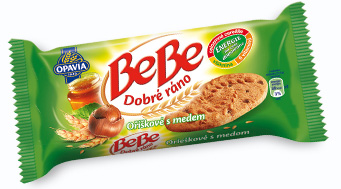 I don’t know how about you but every time I am offering someone a cookie in the Czech language I find myself in a very confusing and uncomfortable situation. To stay true to my Czech soul I want to say ‘susenka‘ but deep inside I know – and you know – that ‘cookie‘ is NOT a ‘susenka‘! Susenka is a waffle-like sweet cracker where as cookie si something…..different; something which does not have its equal in the Czech Republic. Simply put, there is no correct translation for the word ‘cookie‘ and that saddens me. So I guess I will just keep feeling guilty about calling it ‘susenka‘ and wait for that wonderful day when someone else will discover a different, better-fitting translation for it. However, the same acute problem is facing the word ‘muffin‘. Excuse me, but what the heck would you call that in Czech? ‘Buchta‘ – for the lack of a better term??
I don’t know how about you but every time I am offering someone a cookie in the Czech language I find myself in a very confusing and uncomfortable situation. To stay true to my Czech soul I want to say ‘susenka‘ but deep inside I know – and you know – that ‘cookie‘ is NOT a ‘susenka‘! Susenka is a waffle-like sweet cracker where as cookie si something…..different; something which does not have its equal in the Czech Republic. Simply put, there is no correct translation for the word ‘cookie‘ and that saddens me. So I guess I will just keep feeling guilty about calling it ‘susenka‘ and wait for that wonderful day when someone else will discover a different, better-fitting translation for it. However, the same acute problem is facing the word ‘muffin‘. Excuse me, but what the heck would you call that in Czech? ‘Buchta‘ – for the lack of a better term??
Life is so hard sometimes….
My mom sent my bunch of Fidorkas and Milas for my birthday the other day and when my daughter asked me what it was I could finally, without guilt, say: ‘susenka‘ – true susenka.
VOTE ON THIS HOT TOPIC IN THE POLL BELLOW:
 CZ: Ja nevim jak vy, ale ja mam opravdovy problem se slovem ‘cookie’. V cestine pro nej proste neexistuje zadny preklad a proto ‘cookie’ prekladam jako ‘susenka’. Toto chovani ve me ale vyvolava neustaly pocity viny. Susenky preci nejsou ty zvykave, nechutne sladke a cimsi plnene ‘cookies’! Susenky jsou maslove, polevane, kokosove, kakaove…..ale zadny pravy cesky ‘cookie’ proste v Cechach nenajdete. No a to same mate se slovem ‘muffin’; jak byste to prelozili do cestiny? Buchta?? Ale to prece neni buchta!!!!
CZ: Ja nevim jak vy, ale ja mam opravdovy problem se slovem ‘cookie’. V cestine pro nej proste neexistuje zadny preklad a proto ‘cookie’ prekladam jako ‘susenka’. Toto chovani ve me ale vyvolava neustaly pocity viny. Susenky preci nejsou ty zvykave, nechutne sladke a cimsi plnene ‘cookies’! Susenky jsou maslove, polevane, kokosove, kakaove…..ale zadny pravy cesky ‘cookie’ proste v Cechach nenajdete. No a to same mate se slovem ‘muffin’; jak byste to prelozili do cestiny? Buchta?? Ale to prece neni buchta!!!!
Zivot je opravdu nekdy velmi tezky….
Mamka mi nedavno poslala Fidorky a Milu k narozeninam a kdyz se me dcera zeptala, co pry to je, konecne jsem ji svobodne a bez zabran mohla odpovedet: “Susenka!”
VOLTE NA TOTO ZHAVE TEMA V NIZE UVEDENE ANKETE:
![]() Loading ...
Loading ...





Letos v lete jsme byli s rodinou v Cesku na prazdniny. Kdyz jsem babicce ukazovala, jak upect chocolate chip cookies, rikaly jsme jim kukisky. Je ovsem velice malo pravdepodobne, ze jim tak rika krome nas nekdo jiny. I totally get your pain, I don’t know what to call them either. (And a discovery from grocery shopping: cookies, yes, actual moist chocolate chip cookies are available in the Lidl supermarket!!!) A vetsina Cechu, tedy aspon z mladsich generaci uz ‘muffins’ znaji (z McDonaldu, televize a Internetu) a rika se jim normalne muffiny.
Souhlasim s Lenkou. Podle mnohych “oficialnich” prekladu se cookie vetsinou nazyvaji “kolacky”. To ale take neni ten nejtrefnejsi preklad.
Aha,tak na slovo ‘kolacek’ jsem vubec nepomyslela! No, to se mi libi mnohem vic nez ‘susenka’. Tak ted uz budu zase moc spat :))
Uzije nekdo slovo “keks” – jako cookie v Anglii- biscuit
Smala jsem se jak Ti maminka poslala Mily a Fidorky k narozkam protoze ja si nechala poslat Tatranky a Horalky k mym 😉
Jano – no,popravde receno, ja mam fakt asi nejradsi Tatranky (ne Horalky!!!!!) – po pozreni Mily se mi to zase potrvrdilo 🙂
Lauro – na slovo ‘keksy’ jsem taky zapomnela! Pouzivavala to moje babicka 🙂
prece nebudu prekladat cookies jako kolacky, kdyz “kolace” se staly casti anglickeho jazyka…A kazdy spravny American vi, ze cookies nejsou “kolaches”…
V Texase si muzete objednat “Kolaches combo”, napriklad
“Ranchero Kolache & Large Premium Orange Juice” …:)
Moje maminka ma recept velice podobny ke cookies. U nas se tomu rikalo hromadky a peklo se to na vanoce. Susenky jako Be-Be by se dali prelozit jako biscuits. Tatranky a Horalky jako wafer bars. Moje deti dostavaji pravidelne k narozeninam tatranky, nejlepe s liskovymi orisky. There is nothing like it 🙂
No, Mariko tak ty jsi ten orisek uplne rozlouskla!
Mimochodem, tanranky s liskovymi orisky jsou rozhodne na prvnim (!!) miste v mem rebricku ceskych sladkosti…no, praly by se o to ale s polomacenymi susenkami.
Ted jsem objevila tvuj blok, takze prichazim asi s krizkem po funuse. Ale – bohuzel mate trosku mezery v ceskem jazyce. “Susenka” je prave to co je suche, cili bez naplne. Jako treba vyse zminovana bebe a nebo ruzke cajove susenky jako esicka apod. To, co Tana (a vetsina lidi v Ceske Republice) nazyva “susenkou” se spravne jmenuje “oplatka” nebo se jeste pouziva termin “pisingr”. Takze si myslim, ze preklad “susenka” pro “cookie” je celkem trefny. Jak bych ale prelozila termin “oplatka” to teda opravdu nevim 🙂 Jinak diky za zajimavy blog!
One time when the kids in my class repeated their Czech teachers’ false assertion that, “Czech is the most expressive language in the world, with the largest vocabulary of any language,” I wrote a whole bunch of English words on the board and told them to translate them into Czech. I forgot about the word “cookie”, but I gave them the words “pie”, “doughnut”, “bagel” and words for a number of other baked goods, all of which they translated as “koláč”.
I had even more fun with words of various types of cars, such as a pimpmobile, a clownmobile, etc. They also had no Czech words for various car maneuvers, and even skidmarks were just called “čary”. So much for the enormous vocabulary of the Czech language.
I often used to make up terms when I thought the Czech language was missing them, much to the consternation of some Czechs. They didn’t like me calling the flat, round prune koláč “chodská pizza”, but they couldn’t tell me what to call it. I also used to refer to spa town tourists as “oplaťáci”, because they were often seen munching oplatky on the street. (In northern Michigan, the tourists are called “fudgies”, because they’re the only ones who buy the fudge.)
Jamie:
I have to come to Czech language defense here…
As any other language, including English, the Czech language is developing and simply creating words for
new situations, things etc. and dropping words not longer needed…Some words changed meanings (became vulgarismes or became “good” words, like klin or mrdat. The first was not good once upon a time , the other was completely fine )..
Still, I think, English language cannot express feelings and love as well as Czech language…
Your English isn’t perfect, so you may not be able to express feelings and love in English as well as you can in Czech, but that doesn’t mean that English doesn’t have equivalent expressive capability in those realms. After all, people can live 30 years or more in an adopted country with almost no awareness of its language’s basic idioms. I see this every day in my work.
I think also that there are feelings that are more common in Slavic countries than in Western ones, and so you have words for them. For example, I don’t run into Americans expressing škodalibost every day, or even every month, but in Czechland you see that feeling expressed almost daily. Therefore, Czechs have a word for it and Americans have to borrow a German word.
Anyway, objectively speaking, it is a canard that Czech has a vocabulary larger than English, Russian or any other language whose speakers are not paranoid about accepting foreign words.
In Czech language you can invent new words on the fly and people still will understand you. When I introduce my Czech accent to completely understandable English words, people are lost and they don’t understand…
And when they ask where I am from, I have to tell them the truth…..from New Jersey 😉
To Jamie and Vlastimil: I don’t know, I see it from the Vlastimil’s point of view (i.e. Czech has more expressions/words) but then my English teacher here in the US was claiming the same thing as Jamie. But I definitely don’t think the Czech language can express love better than English. Just look at the proof Vlastimil, most Czechs have emotional issues because they were not told enough they were loved. It feels pretty awkward to tell a child in Czech I love you (“mam te rad”). I think Czechs express their love through hugs and cuddling…because there is not ENOUGH words to express love in Czech language.
Tanja: I certainly cannot write here what poetic words I am using when I want to express love 😉 For example, “zdrobneliny” (what is the English equivalent?) are so sexy when used right …and you can create “zdrobneliny” of “zdrobneliny” to get deeper in hearts of your loved 😉
But it is true, sometimes it is easier to express myself in English. For example: “I have been pulled over for speeding 62 in 50 and got warning with no points….” It would take me ages to figure it out how to say it in Czech …
Again, it may not be the most correct English, but that’s how we speak in New Jersey 🙂
Isn’t amazing how “susenky” can start a linguistic discussion ?
Yeah, I agree with you on ‘zdrobneliny’. I guess I was thinking more about word expressions when you said that. Zdrobneliny are priceless :))
It would be interesting what kind of discussion would ‘susenecky’ start?! Or “Susenenencky”??!!! That would have to be some really loving discussion 😉
Zdrobněliny are called diminutives in English. We have quite a lot of suffixes for creating them, but it’s not a “system”, like in Czech. We create the same effect by rhyming and rhythmic versions of people’s names or by various other linguistic mechanisms. I used to do it by adding phony Italian, Russian and Spanish suffixes to the girl’s first, middle and nicknames. We have plenty of ways to get the message across.
But from the point of view of a native English speaker who has been in relationships with non-native speakers, I can tell you how your point of view is skewed: The non-native speaker is unlikely to learn the nuances and word play that native speakers use. In fact, they may not have any opportunity. When they get into a relationship with a native speaker, he or she probably won’t use those various mechanisms, because his or her loved one can’t understand them and they take too much explaining. So the native speaker scales down his or her English, and since the non-native partner doesn’t hear the full range of English expression of affection (in our example), he or she just assumes that English is deficient in that realm, when it’s actually not.
In fact, if a non-native speaker does pick up certain intimate language, native speakers find it shocking and even funny. I picked up a lot of Czech baby-talk and motherese, and Czechs would go into hysterics when they heard me use it, even if I did it correctly in the right situation.
Jamie: You are absolutely right on both fronts! I am sad to say but English is much richer language in terms of number of words. In English language there should be over 1 million words now (in 2006 there were 986,000 and about 10,000 new words per year is being created) http://www.npr.org/templates/story/story.php?storyId=5182871). In czech, however, there are “only” about 250,000-300,000 words (http://www.ivextrans.eu/czlang/czech.php). When I first heard this statistics I was disapointed and shocked because I was always so proud of my beautiful and flowery Czech language, but unfortunately, as Jamie has demonstrated, it is true. I would just add words to the list that are impossible to translate without an actual description: update, goof off, hang out.
As far as the fact that English speakers use simpler language when talking to non-native-English speakers, I’ve heard that from my husband before. His job demands the knowledge of slightest nuances in the language, but, as he mentions he can’t use those with me.
To close, I love zdrobneliny and I do use them in the English language. Sometimes people look at me that like I am crazy, but when I explain that in Czech we use diminutives all the time, they understand.
I love you all 😉
Wow! Thanks for the statistics update Kamila! I can’t believe that we have only about 1/4 of the number of words in Czech than it is in English language! But if you add those zdrobneliny to it, i think we may be just behind English 😉
The question is, how many words are being used in everyday conversation… Does any have a statistics
regarding everyday use of English vs. Czech?
Anyway, I think a foreigner will pick up Czech language much faster than English…. If you live in Czechlands, you “have” to speak a lot ….
O.K., Vlastiku, I have not found how many words are used in everyday conversation. But, I found that there are 10,000 new words created per year in English (http://www.npr.org/templates/story/story.php?storyId=5182871). Ustav pro jazyk cesky, Akademie ved CR published two dictionaries of new words created between 1995 and 2005 (http://www.ujc.cas.cz/oddeleni/index.php?page=shrnuti_1 & http://www.ujc.cas.cz/oddeleni/index.php?page=anotace_neol2). In both books together there are 11,600 new words. That means that while there were about 100,000 new words created in English during those 10 years, in Czech the number was only 11,600. Based on this statistics, I think it is safe to say that English uses much many more words than Czech (if people didn’t use them, they would not be counted).
I have to respectfully disagree with your statement that if one lives in the Czech Republic, they have to speak Czech. Maybe that is the case if one happens to live in Lhota (the most common name for the Czech village), but not in Prague. Almost everybody in Prague speaks English. I know many foreigners living there for 10 years and over and all they can do is order a beer in Czech (little exaggeration here). My own husband hasn’t started learning until he had a motivation – meeting. Before then (for a year and a half living there) he even hasn’t tried knedliky :-). In both countries learing (about any subject) is a question of priorities and how important that particular subject is to that person. If am a Chinese living in the Chinese community in San Francisco (highest Chinese population outside of China) and I don’t want to venture out of that community, I don’t need to study English. If I am American living in Prague surrounded by English-speaking expats and Czechs knowing that my assignment will end in one year and I am not interested in learning Czech, I will not study Czech (which is one of the most difficult language to learn). It is as simple as that.